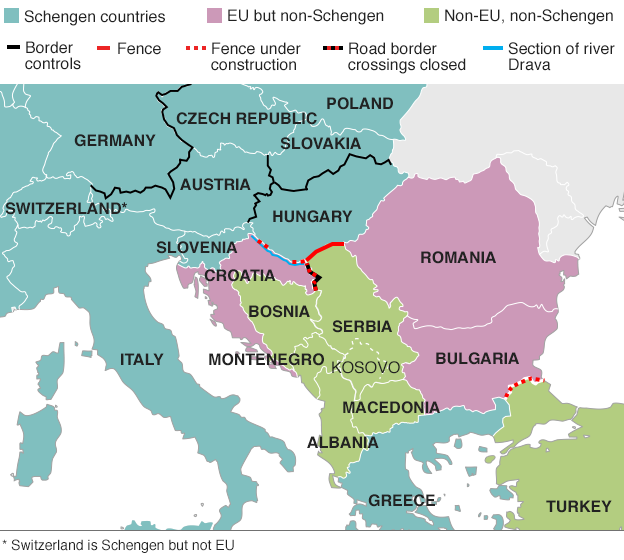
Migrant route nations cautiously welcome EU action plan
Ljubljana:European countries facing an unprecedented influx of migrants on Monday cautiously welcomed new EU plans to help stem the crisis following an emergency mini-summit at the weekend.
The European Union pledged to help set up 100000 places in reception centres along the route through the Balkans seeking to defuse seething tensions on its southeastern rim as tens of thousands of migrants head to northern Europe.
A 17-point plan announced after emergency talks between the heads of 10 EU nations and non-EU Albania Serbia and Macedonia includes an undertaking that no country will let migrants through to an adjoining state without prior agreement.
It also speeds up information exchanges between countries to coordinate their efforts.
In the small Alpine nation of Slovenia which has been swamped by migrants in recent days government spokesman Bojan Sefic described the outcome as "a lot of progress" with the promise of "more cooperation".
Prime Minister Miro Cerar had earlier warned it was "crucial" that commitments made at the summit were fulfilled without delay.
In Austria -- the next transit country for migrants after Slovenia -- Interior Minister Johanna Mikl-Leitner said decisions made in Brussels were "a step in the right direction".
Battling rain wind
More than 670000 people have reached European soil this year -- many of them fleeing violence in Syria Iraq and Afghanistan -- in the continent's worst migration crisis since World War II.
Some 3000 have died making the dangerous Mediterranean sea crossing and with winter fast approaching the fear is that more could face the same fate on the land route through the Balkans.
Underscoring the dangers Greek police said the bodies of two young migrants had washed up on the islands of Lesbos and Chios on Monday.
At Berkasovo on the Serbia-Croatia border an AFP journalist saw hundreds of migrants battling rain and cold winds plodding along in a long column.
Tensions within Europe have grown after Bulgaria Romania and Serbia warned over the weekend they could close their borders to stop them becoming a "buffer zone" for the streams of people entering Europe every day.
Macedonian President Gjorge Ivanov warned his tiny Balkan nation a key transit state could host a maximum of 2000 migrants if crossing points were shut down.
The EU's new reception centres to be provided with the help of the UN's refugee agency will help provide shelter and speed up registration of migrants according to European Commission President Jean-Claude Juncker.
Some 50000 places will be created across Balkan countries such as Macedonia and Serbia while the other half will be located in Greece.
"The uncontrolled flow of people must be stopped" Juncker told a press conference after the summit.
"It cannot be that in the Europe of 2015 people are left to fend for themselves sleeping in fields."
Countries overwhelmed
Most migrants land first in Greece but desperate to get to Germany and wealthier northern European countries thousands have pushed on rather than staying there to have their asylum applications processed as is required under EU rules.
Moving up through the Balkans they have overwhelmed many countries with Hungary closing border crossings with Serbia and then Croatia to halt the flow.
Croatian Prime Minister Zoran Milanovic said that Brussels' plan for increased support from EU border agency Frontex could also help to control the situation on the border with Serbia -- "but under the presumption that everything functions from Greece across Macedonia to Serbia".
Hungary's border closures have sparked tensions with Brussels fellow EU members and particularly its neighbours.
And as more and more countries shutter their borders -- or threaten to do so -- fears are growing that the EU's cherished Schengen system of frontier-border-free travel will be wrecked.
Slovenia a country of around two million people has been swamped by more than 73000 migrants since mid-October and some 12000 were in the country's camps and centres early Monday police said.
In signs of the strains in France two NGOs launched legal action Monday to force authorities to take urgent measures over the Calais migrant camp known as "the Jungle" where about 6000 live in substandard conditions.
In the eastern German city of Dresden meanwhile between 10000 and 12000 people rallied Monday in support of the anti-migrant movement PEGIDA according to the local university a specialist in estimating crowd size.
Between 1100 and 1300 took part in a counter-rally.
PEGIDA staged its first street rally on October 20 2014 and at a peak in January drew 25000 at its weekly gatherings before controversy began to swirl around its co-founder Lutz Bachmann.
AFP

Legal Disclaimer:
MENAFN provides the
information “as is” without warranty of any kind. We do not accept
any responsibility or liability for the accuracy, content, images,
videos, licenses, completeness, legality, or reliability of the information
contained in this article. If you have any complaints or copyright
issues related to this article, kindly contact the provider above.


















Comments
No comment